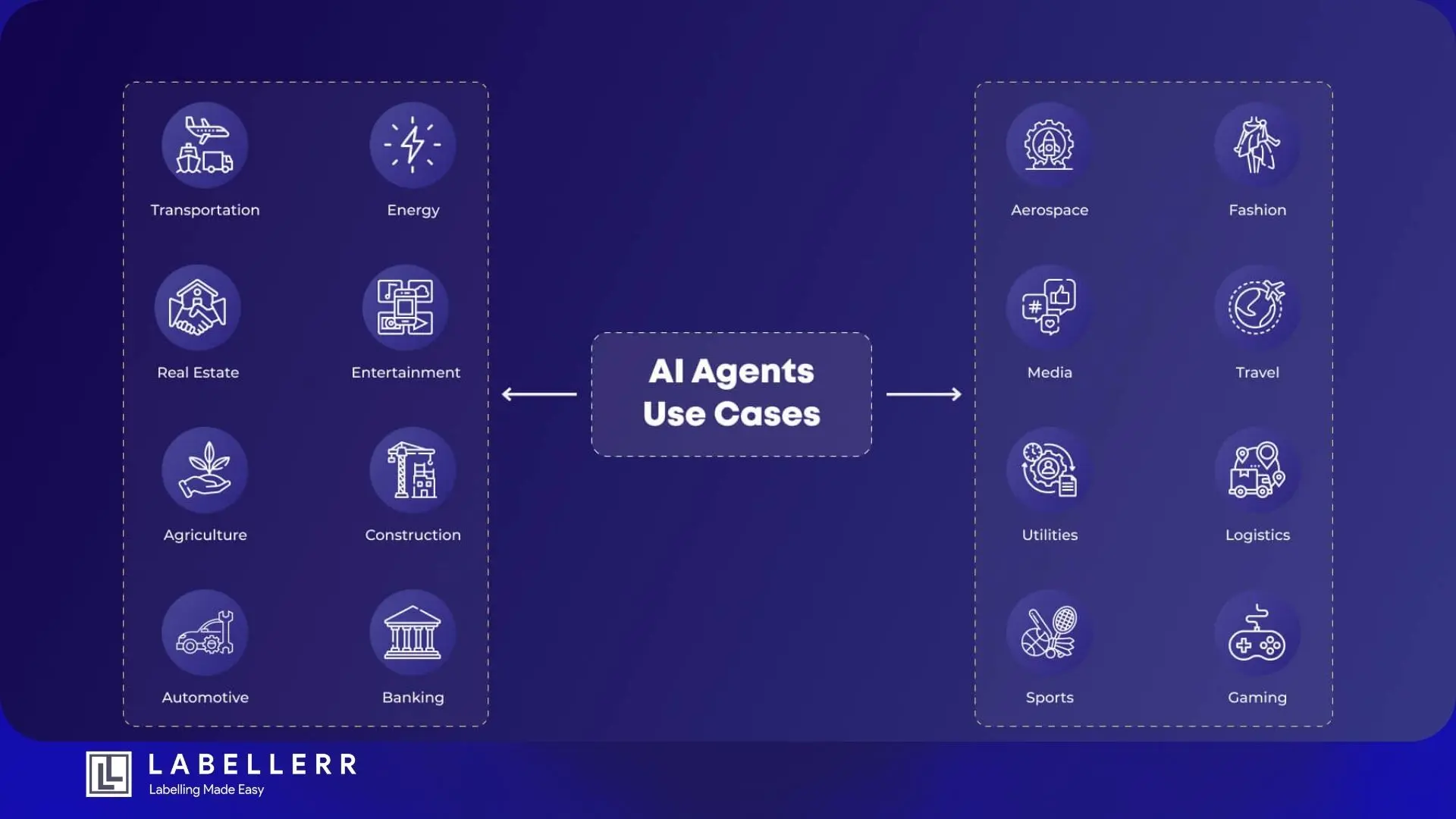AI Agents at Work: Applications Across Industries
AI agents are transforming industries like e-commerce, healthcare, and finance by automating tasks, improving decision-making, and enhancing customer experiences. From fraud detection to medical diagnosis, these intelligent systems boost efficiency and accuracy across various sectors.

AI agents are transforming industries by automating processes, improving decision-making, and increasing efficiency.
These intelligent systems can analyze vast amounts of data, learn from interactions, and execute tasks with precision.
Businesses across different sectors use agents to optimize workflows, enhance customer experiences, and boost productivity.
Table of Contents
E-Commerce
Agents are transforming e-commerce by helping businesses offer personalized shopping experiences and improve operational efficiency.
These intelligent systems analyze customer data, automate key processes, and provide real-time support, making online shopping smoother and more engaging for users.
Personalized Recommendations
Agents study customer behavior, purchase history, and browsing habits to suggest relevant products.
By analyzing patterns, these agents predict what customers might be interested in, increasing engagement and boosting sales.
For example, e-commerce platforms like Amazon and Shopify use AI-driven recommendation engines to show users products based on their past interactions.
These recommendations appear on homepages, product pages, and checkout screens, encouraging customers to explore more items and make additional purchases.
AI-powered personalization also enhances the customer experience by reducing search time and providing highly relevant product suggestions.
Order Automation and Customer Support
Agents automate key e-commerce operations such as inventory management, order processing, and logistics coordination.
These agents track stock levels, predict demand, and automatically reorder products when inventory runs low. This ensures smooth supply chain management and prevents stock shortages or overstocking.
In customer service, AI-powered chatbots provide 24/7 support, helping customers with product inquiries, order tracking, returns, and refunds.
These chatbots can handle thousands of queries simultaneously, reducing wait times and improving response accuracy.
By automating customer interactions, businesses improve satisfaction rates and free up human agents to handle more complex requests.
Agents also enhance fraud detection by analyzing transaction patterns and flagging suspicious activities.
This helps prevent unauthorized transactions, reducing the risk of financial loss for both businesses and customers.
Healthcare
Agents are transforming healthcare by helping doctors, nurses, and researchers improve diagnosis, patient monitoring, and overall medical efficiency.
These intelligent systems analyze vast amounts of medical data, detect health risks early, and automate critical processes to ensure better patient outcomes.
Diagnosis Assistance
Agents are revolutionizing medical diagnostics by analyzing medical images, detecting diseases, and assisting doctors in making accurate diagnoses.
These AI systems process X-rays, MRIs, CT scans, and pathology slides with high precision, helping doctors identify conditions like cancer, fractures, and neurological disorders more effectively.
For example, IBM Watson Health uses AI to scan medical literature, research papers, and patient records to suggest potential diagnoses and treatment plans.
This enables doctors to make informed decisions faster, reducing the chances of misdiagnosis and improving patient care.
AI-driven tools also assist radiologists by highlighting abnormal areas in scans, ensuring critical conditions are detected early.
Patient Monitoring
AI-powered monitoring systems track patient vitals, detect abnormalities, and send alerts to healthcare providers if any risks are detected.
These systems analyze data from wearable devices, such as smartwatches and biosensors, to monitor heart rate, blood pressure, oxygen levels, and other health indicators in real time.
For instance, AI-driven remote monitoring platforms help doctors track patients with chronic diseases like diabetes or heart conditions.
If an agent detects a sudden spike in blood sugar or an irregular heartbeat, it can send an instant alert to the healthcare provider, allowing for quick medical intervention.
This proactive approach prevents complications, reduces hospital readmissions, and improves patient outcomes.
AI in Drug Discovery and Personalized Treatment
Agents assist in drug discovery by analyzing vast datasets to identify potential drug candidates.
By processing genetic information, AI can help develop personalized treatment plans tailored to individual patients.
This is particularly useful in oncology, where AI-driven precision medicine suggests targeted therapies based on a patient’s unique genetic profile.
Administrative Automation
Agents also streamline administrative tasks in healthcare, such as scheduling appointments, managing medical records, and processing insurance claims.
Chatbots and virtual assistants help patients book consultations, answer health-related queries, and remind them to take medications.
This automation reduces the workload on healthcare staff, allowing them to focus more on patient care.
Finance
Agents are transforming the financial industry by improving security, optimizing investments, and automating routine banking operations.
These intelligent systems can analyze vast amounts of financial data, detect fraud, and assist in making informed investment decisions.
Fraud Detection
Agents play a crucial role in fraud prevention by scanning financial transactions and identifying suspicious activities in real time.
Machine learning models analyze customer spending patterns and flag anomalies that may indicate fraudulent transactions.
For example, AI-powered fraud detection systems in banks can recognize unusual withdrawal patterns, multiple failed login attempts, or sudden large transactions.
If an agent detects suspicious activity, it can automatically block the transaction, notify the user, and alert the bank’s fraud prevention team.
This proactive approach helps financial institutions minimize financial losses and protect customers from cyber threats.
Algorithmic Trading
AI-driven trading bots analyze market trends, economic indicators, and historical data to make fast and efficient investment decisions.
These bots execute trades at high speeds, optimizing buy and sell strategies to maximize returns and minimize risks.
Financial institutions and hedge funds use AI trading systems to react to market fluctuations instantly. Unlike human traders, AI bots operate 24/7 and process vast amounts of financial data in seconds.
This enables better market predictions and improved risk management, making algorithmic trading a powerful tool for financial growth.
Automated Customer Service
AI-powered chatbots and virtual assistants are revolutionizing customer service in banking.
These agents handle inquiries related to account balances, transaction history, and loan applications, providing customers with quick and accurate responses.
For example, AI-driven customer support platforms like chatbots help banks reduce wait times, answer frequently asked questions, and guide users through financial transactions.
This improves customer satisfaction and reduces the workload on human representatives.
Manufacturing
Agents in manufacturing help companies improve efficiency, reduce operational costs, and maintain high-quality production standards.
These AI-driven systems optimize workflows, detect defects, and predict maintenance needs, ensuring smooth manufacturing processes.
Predictive Maintenance
AI-powered predictive maintenance systems analyze data from industrial machines and equipment to detect early signs of wear and tear.
By monitoring temperature, vibration, and other performance indicators, agents predict potential failures before they occur.
For example, factories using AI maintenance systems can schedule repairs proactively, reducing unexpected downtime and costly breakdowns.
This improves overall efficiency and prevents production delays, ensuring smooth operations.
Quality Control
Agents inspect products for defects using computer vision and machine learning. These systems analyze images of manufactured goods and identify inconsistencies, ensuring only high-quality products reach consumers.
For example, in automobile manufacturing, AI-powered quality control systems scan car parts for defects before assembly.
In electronics manufacturing, agents verify the accuracy of circuit boards and components. By automating quality inspections, manufacturers reduce errors, increase production speed, and maintain product reliability.
Supply Chain Optimization
Agents also improve supply chain management by analyzing demand trends, optimizing inventory levels, and predicting delivery delays.
This allows manufacturers to reduce waste, lower storage costs, and ensure timely deliveries.
Marketing
Agents are transforming digital marketing by automating tasks, optimizing ad campaigns, and analyzing customer sentiment.
These intelligent systems help businesses reach the right audience, improve engagement, and maximize return on investment.
You can check out Lyzr, an agent infrastructure platform for
building your AI workforce.
Ad Campaign Automation
Agents track user behavior, monitor browsing patterns, and analyze engagement levels to improve ad targeting.
These systems adjust marketing strategies in real time, ensuring that businesses reach their target audience more effectively.
For example, AI-powered tools like Google Ads and Facebook’s AI-driven ad platforms optimize ad placements by analyzing which advertisements perform best with specific demographics.
They automatically adjust budgets, recommend creative content, and improve bidding strategies to maximize the effectiveness of campaigns.
This automation allows businesses to get better results with minimal manual intervention.
Sentiment Analysis
Agents process customer reviews, social media comments, and online discussions to measure public sentiment toward a brand.
They use natural language processing (NLP) to identify whether customer opinions are positive, negative, or neutral.
For example, companies use AI sentiment analysis tools to track brand perception and identify areas for improvement.
If a business sees a surge in negative feedback after a product launch, AI can help pinpoint the main concerns, allowing companies to take immediate action.
By understanding customer sentiment, businesses can refine their marketing strategies, enhance brand reputation, and improve customer satisfaction.
Human Resources
Agents streamline HR operations by automating hiring, onboarding, and employee engagement processes. They save time for HR professionals, improve efficiency, and enhance the overall employee experience.
Recruitment Automation
AI-powered recruitment tools scan resumes, evaluate candidates, and schedule interviews automatically. These systems use machine learning to identify the most qualified applicants based on job descriptions and past hiring data.
For example, platforms like LinkedIn Talent Solutions and AI-driven applicant tracking systems (ATS) help businesses find top talent faster.
Agents analyze resumes, compare skills, and even conduct initial interview assessments using chatbots. This automation reduces recruitment time, minimizes biases, and ensures a more efficient hiring process.
Employee Onboarding
Agents assist new employees by providing training materials, answering frequently asked questions, and guiding them through company policies.
This reduces administrative workload and ensures a smooth onboarding experience.
For example, AI-powered virtual assistants in HR platforms help new hires complete paperwork, schedule orientation sessions, and access learning resources.
By automating these tasks, businesses can ensure employees integrate quickly into their roles while HR teams focus on strategic initiatives.
Software Development
Agents enhance software development by automating coding, debugging, and version control.
They help developers work faster, reduce errors, and maintain high-quality software.
Code Generation
AI-powered coding assistants like GitHub Copilot suggest code snippets, auto-complete functions, and even write entire lines of code.
These tools analyze existing code structures and predict what developers need next, reducing manual effort and improving productivity.
For example, a developer working on a web application can use an AI-powered tool to generate boilerplate code, reducing time spent on repetitive tasks.
This allows developers to focus on higher-level problem-solving and innovation.
Debugging and Version Control
Agents detect coding errors, recommend fixes, and automate version control. These systems help developers identify bugs before they impact software performance.
For example, AI-driven debugging tools analyze error logs and suggest corrections in real time.
AI-assisted version control systems track code changes, resolve conflicts, and ensure smooth collaboration among development teams.
By integrating AI into software development, companies can reduce downtime, accelerate project timelines, and improve code quality.
Gaming
Agents are transforming the gaming industry by making virtual environments more interactive and engaging.
They enhance player experiences by enabling adaptive characters, dynamic storytelling, and personalized gameplay.
Adaptive NPCs
Non-player characters (NPCs) powered by AI can learn from player actions and adjust their behavior accordingly.
Unlike traditional NPCs that follow scripted actions, AI-driven NPCs react in real time, making the game more immersive.
For example, in open-world games like The Elder Scrolls V: Skyrim, AI-powered NPCs adjust their dialogue and actions based on player choices.
This creates a more realistic gaming experience where NPCs remember past interactions and change their responses dynamically.
Dynamic Storylines
Agents generate personalized game narratives that evolve based on player choices. Instead of following a fixed storyline, games powered by AI offer unique experiences with each playthrough.
For example, AI-driven storytelling engines in role-playing games (RPGs) analyze player decisions and modify quests, dialogues, and endings accordingly.
This ensures that every player experiences a unique journey, increasing replayability and engagement.
Conclusion
Agents are reshaping industries by automating tasks, improving decision-making, and enhancing user experiences.
From healthcare and finance to marketing and gaming, businesses are leveraging AI-driven solutions to optimize processes and drive growth.
As AI technology continues to evolve, agents will become even more intelligent, adaptable, and integral to various industries.
FAQs
What are AI agents?
AI agents are autonomous systems that perceive their environment, process data, and take actions to achieve goals. They are used in finance, healthcare, and e-commerce.
How do agents work?
Agents use machine learning, NLP, computer vision, and reinforcement learning to analyze data, make decisions, and automate tasks.
How are agents different from chatbots?
Chatbots handle text-based interactions, mainly for customer support, while agents perform complex tasks like decision-making, workflow automation, and data processing.
What are the main types of agents?
Agents are categorized by intelligence level (reflex, model-based, goal-based, utility-based, learning) or function (conversational, task-oriented, multi-agent).

Data Annotation Workflow Plan
Simplify Your Data Annotation Workflow With Proven Strategies
Download the Free Guide

